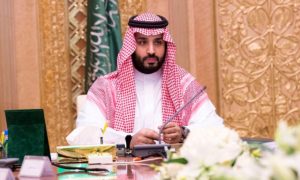Saudi Arabia’s execution of a prominent political leader of the monarchy’s Shiite minority has worsened Mideast tensions and is forcing the Obama administration to decide if there are any limits to the outrages that the longtime U.S. “ally” may commit, as Trita Parsi explains.
There should be little doubt that Saudi Arabia wanted to escalate regional tensions into a crisis by executing Shi’ite cleric Nimr al-Nimr. On the same day, Riyadh also unilaterally withdrew from the ceasefire agreement in Yemen.
It is difficult to see that Saudi Arabia did not know that its decision to execute Nimr would not cause uproar in the region and wouldn’t put additional strains on its already tense relations with Iran. The inexcusable torching of the Saudi embassy in Iran — Iranian President Hassan Rouhani condemned it and called it “totally unjustifiable,”.
Saudi Arabia has long opposed diplomatic initiatives that Iran participated in – be it in Syria or on the nuclear issue – and that risked normalizing Tehran’s regional role and influence.
Earlier, Riyadh had successfully ensured Iran’s exclusion from Syria talks in Geneva by threatening to boycott them if Iran was present.
In fact, according to White House sources, President Barack Obama had to personally call King Salman bin Abdulaziz Al Saud to force the Saudis to take part in the Vienna talks on Syria this past fall.
Now, by having cut its diplomatic relations with Iran, the Saudis have the perfect excuse to slow down, undermine and possibly completely scuttle these U.S.-led negotiations, if they should choose to do so.
From the Saudi perspective, geopolitical trends in the region have gone against its interests for more than a decade now. The rise of Iran – and Washington’s decision to negotiate and compromise with Tehran over its nuclear program – has only added to the Saudi panic.
To follow through on this way of thinking, Riyadh’s calculation with the deliberate provocation of executing Nimr may have been to manufacture a crisis — perhaps even war — that it hopes can change the geopolitical trajectory of the region back to the Saudi’s advantage.
The prize would be to force the United States to side with Saudi Arabia and thwart its slow but critical warm-up in relations with Tehran. As a person close to the Saudi government told the Wall Street Journal: “At some point, the U.S. may be forced to take sides [between Saudi Arabia and Iran] … This could potentially threaten the nuclear deal.”
Washington should not repeat Tehran’s mistake and walk into this Saudi trap. In fact, from the U.S. perspective, Saudi Arabia’s destabilizing activities are a vindication of the nuclear deal it struck with Iran in 2015. One critical benefit of that deal, left unstated by Obama administration officials, is that it helped reduce U.S. dependency on Saudi Arabia.
By resolving the nuclear standoff and getting back on talking terms with Iran, Washington increased its options in the region.
As Admiral Mike Mullen wrote in Politico last year in regards to the benefits of the nuclear deal: “It would also more fairly rebalance American influence. We need to re-examine all of the relationships we enjoy in the region, relationships primarily with Sunni-dominated nations. Detente with Iran might better balance our efforts across the sectarian divide.”
Mindful of the deliberate manner Saudi Arabia is driving matters towards a crisis in the region – partly motivated by a desire to trap the United States in Riyadh’s own enmity with Iran – Washington is clearly better off being able to play a balancing role between Saudi Arabia and Iran rather than being obligated to fully support Saudi Arabia’s regional escapades.
The question is, however, if Washington’s desire to stay out of this fight is tenable. Obama administration officials have already expressed concern over how this Saudi-initiated crisis is affecting the fight against DAESH, also known as ISIS and ISIL, and diplomacy over Syria.
“This is a dangerous game [the Saudis] are playing,” an unnamed U.S. official told the Washington Post. “There are larger repercussions than just the reaction to these executions,” including damage to counter-DAESH initiatives as well as the Syrian peace process.
If Washington’s priority is the defeat of DAESH and other jihadist movements, then a balancing act between an Iran that ferociously opposes DAESH and a Saudi Arabia that has played an undeniable role in promoting jihadi extremism may not be the right answer.
The regime in Saudi Arabia has been strongly criticized by human rights organizations.
Saudi Arabia has been compared to Daesh in long time now, especially for their support of terrorist organizations in Iraq, Syria and Yemen.
Hashtags #SueMeSaudi and #SaudiArabiaIsISIS has now many hits every minute, and many want to mark their opposition and to show their distance to the brutal dictator regime in Saudi Arabia.
Saudi Arabia practice Wahhabism ideology, a strictly fundamentalist orientation within Sunni Islam, which in practice is the state religion in the country. It is also ideology direction that has inspired al-Qaida and Daesh.







